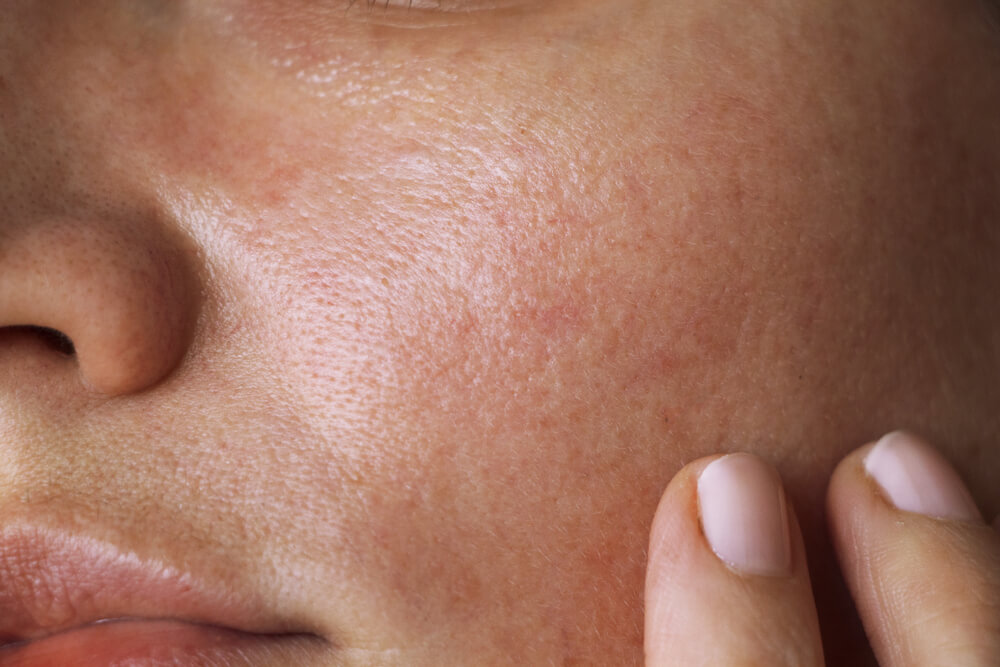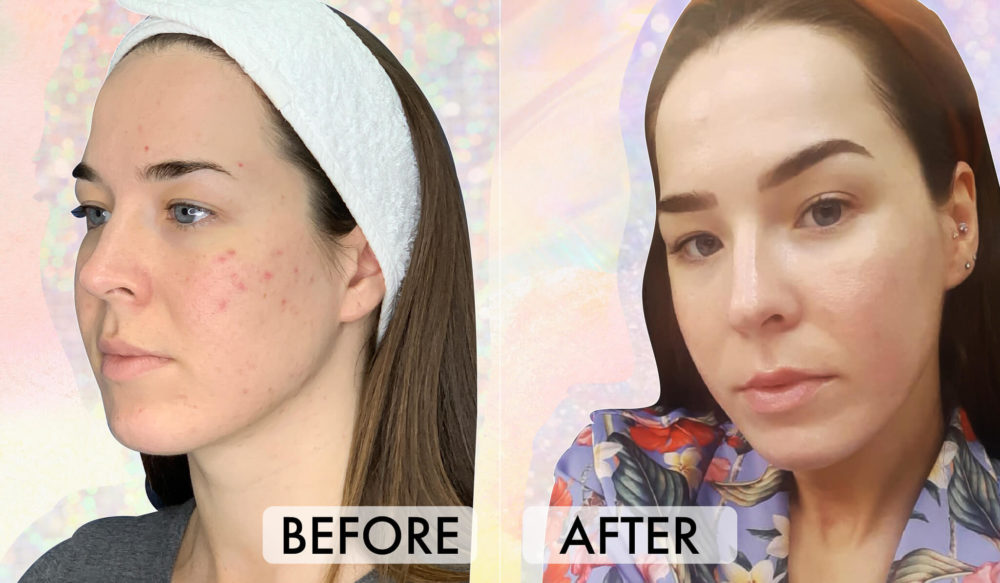This Is Basically a Miracle Treatment for Acne Scars

Dealing with acne is a battle as is, then you add in the fact that it tends to cause lingering post-inflammatory hyperpigmentation (PIH) and even permanent scars. Kendall Jenner is easily one of the most high-profile people who has openly dealt with acne and all the related scarring, and she also has access to some of the best treatments in the world. One of her go-to treatments is Laser Genesis, which some also refer to as a “laser facial treatment,” but it’s surprisingly accessible.
Whether your end-game is to treat acne and acne scarring or you’re simply curious about how Laser Genesis can up your glow factor, we’ve outlined everything you need to know about the treatment below.
How Does Laser Genesis Work?
In short, Laser Genesis is non-invasive, non-ablative treatment (it doesn’t injure the surface of the skin, so no peeling), that gently delivers heat to the dermal (deeper) layer of the skin to regenerate collagen.
“The treatment is scientifically proven to improve acne, acne scars, fine lines and wrinkles, and shrink pore size,” says Heather Rohrer, a physician assistant and owner of Center for Aesthetic Medicine and Human Performance in Las Vegas, Nevada. “The heat from the laser kills bacteria on the skin and deep within the skin, which drastically helps diminish active acne while preventing further breakouts. The heat also stimulates collagen production, which is what helps remodel/heal scars and improve the appearance of fine lines and wrinkles.”
She says that Laser Genesis is recommended for treating the face, neck, and chest which is where it’s most often performed. However, it can also work on other parts of the body to help with scar reduction.
View this post on Instagram
Laser Genesis vs IPL: The Difference!
Laser Genesis and IPL (intense pulsed light) are like sister treatments: similar, but not quite the same. The primary difference is the type of device that’s used.
“Laser Genesis is a laser that uses a single wavelength of light to target a specific molecule in the skin called a chromophore. On the other hand, IPL uses multiple wavelengths of light so it has multiple targets,” says Dr. Zain Husain, a board-certified dermatologist and founder of New Jersey Dermatology and Aesthetics Center.
When trying to decide between the two, it’s important to consider a few things. First, note that IPL, which is not a laser, is only safe to use on lighter skin tones. When used on darker complexions, it can potentially cause an over-production of skin pigmentation. Laser Genesis is generally considered safer for all skin types.
Rohrer adds, “What type of treatment you choose also depends on the condition of your skin and the things you want to treat. While IPL is great for rosacea, skin discoloration, and aging skin, Laser Genesis is better for targeting acne, pore size, fine lines, and uneven skin texture and tone. I recommend a thorough consultation with a skin expert to determine which treatment if not both is right for you.”
What a Laser Genesis Treatment Feels Like
When compared to other forms of lasers, Laser Genesis falls on the mild end of the spectrum in terms of causing discomfort. Dr. Husain says that the laser causes a warm sensation versus the sharp stings or “rubber band snaps” that other lasers can create. Before your treatment, you’ll be guided into a calm room where you’ll be instructed to lie on a comfy treatment bed. From there, your face will be cleansed thoroughly.
“I have trained my aestheticians to do an extensive examination of the skin after the cleaning,” says Rohrer. “If the patient has excess dead skin buildup or excess facial hair, they are instructed to perform dermaplaning or microdermabrasion.”
Both of these pre-treatments help the laser penetrate more deeply, which results in a more effective treatment. Once the skin is prepped and metal safety goggles are put on, your treatment will begin.
“Laser Genesis is performed by taking a handheld device that is slowly moved back and forth over the skin, gently warming up the dermis. Treatment typically takes around 30 minutes, and most patients enjoy the warm feeling, describing it as ‘warm sunlight’ hitting their face.”
Board-certified dermatologist and writer of our go-to beauty book, Beyond Beautiful, Dr. Doris Day, says that you should “Tell the person doing the treatment if it feels too hot since that could be a sign of too much energy that could damage the skin or fat.” Dr. Day explains that “The idea is to heat up the skin to a specific temperature. If you go too low you won’t get results, if you go too high, you’ll melt fat. When I do the treatment I measure skin temperature so I know exactly where it’s at, and I also constantly ask the patient how they are feeling. Both sets of feedback information are very important and helpful.” This is one of the reasons Dr. Day recommends having an experienced board-certified dermatologist perform the treatment.
Common Side Effects and Expected Down Time
Given its gentle nature, you can expect minimal downtime and only mild side effects following a Laser Genesis treatment. Dr. Zain says, “There’s often some redness and mild swelling, but the redness usually subsides within a few hours after the treatment for most people. Following your treatment, strict sun protection with a broad-spectrum sunscreen is essential to reduce the risk of post-inflammatory hyperpigmentation (PIH).”
You can resume your normal activities immediately following the treatment, and some people note that they even have a nice, subtle glow afterward.
How Many Laser Genesis Sessions You’ll Need & Total Average Cost
Both Dr. Husain and Rohrer agree that four to six treatments with about a month between each treatment is ideal for best results. The cost per treatment is $300 to $500, so you can expect to pay between $1200 and $3000 after all’s said and done.
What Results You Can Expect with Laser Genesis
Laser Genesis treatments are cumulative, so with every additional treatment you’ll see exponential improvement in your skin.
“Overall, results after multiple treatments can decrease redness, improve acne scarring, even out skin tone, stimulate new collagen production, reduce the amount of fine lines you have, and provide a more glowing and youthful look,” says Dr. Husain.
Rohrer notes that many of her patients begin seeing results after three treatments but that, depending on the skin’s condition, it can take up to six treatments to achieve those noticeable, permanent results. To get a better idea of what you can expect, we recommend reviewing the written reviews and library of before and after images on RealSelf.
Laser Genesis Side Effects
Let’s remember that although this laser treatment is extremely effective and can yield incredible results, it also needs to be handled with care. Dr. Day warns, “The NdYag laser is a potentially very powerful laser and if used incorrectly there is risk of scarring, fat loss and skin discoloration.” To safeguard against these risks, Dr. Day tells us to “Be sure to see a board-certified dermatologist who has experience with this laser or a person they specifically delegate to do the treatment. It is an advanced treatment and should not be done in spas or by untrained technicians.”
Dr. Day also says it’s important to “Tell the doctor if you have excessive pain during the treatment or if you have blisters afterward. If you’re having a treatment on the body for contouring we often use a cooling device to protect the outer layers of the skin as we do the treatment.” Finally, “Make sure to have proper eye protection. This laser can go deep so it’s not enough to simply close your eyes. You need metal goggles or specific metal eye shields if areas very close to the eyes are being treated.”
The Best Candidate for Laser Genesis
Anyone dealing with large pores, acne, and acne-related scarring – including indented/atrophic scars (ice pick, rolling, boxcar) and raised/hypertrophic scars (keloids) – is considered a primary candidate for Laser Genesis. If fine lines and wrinkles have you feeling frustrated, the treatment targets that issue, as well.
“Typically, Laser Genesis patients in their late 20s and 30s greatly benefit from the treatment due to the collagen production it simulates. At as early as 25 years old, our bodies significantly begin to slow down the production of collagen and getting Laser Genesis is an excellent way to produce more if it.”
Whatever your skin sitch, we recommend hitting up a board-certified dermatologist in your city to see what the treatment can do for you. And TBH, if Laser Genesis is good enough for Kendall, it’s def good enough for us.























Leave a comment